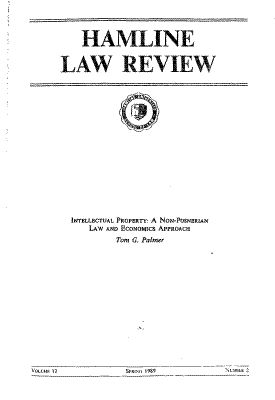| These are some philosophical
works dealing with the rationale for and future of IP law. start earning Quantum Elite my feedback
 Code
and Other Laws of Cyberspace Code
and Other Laws of Cyberspace
by Lawrence Lessig
Lessig tackles the tricky and troubling question
of Internet regulation. Cyberspace has no intrinsic structure to
protect its libertarian nature, and we are now well into an era
where commerce and its partner in control, government, are working
in a manner that could permanently, and perhaps negatively, alter
its character. Now is the time for all who stand to benefit from
the unique nature of cyberspace to assert their collective values
into a framework for regulating it. Apathy or inaction, Lessig argues,
would result in a medium shaped by special interests. His book is
replete with examples of failed attempts to address cyberspace issues,
such as the 1996 Communications Decency Act. A central theme is
that the architecture of cyberspace can be coded to address properly
salient issues related to free speech, intellectual property, and
privacy. This is a vital book for concerned citizens of cyberspace.
Recommended for academic and larger public libraries. -Philip Y.
Blue, New York State Supreme Court Criminal Branch Library
here
is a link to the Wiki for a new version of Code.
 DIGITAL
COPYRIGHT DIGITAL
COPYRIGHT
by Jessica Litman
Litman (law, Wayne State U.) makes a forceful argument, written
in clear English, for the imminent and current problems to be expected
from the 1998 Copyright Law in the US, as well as other rulings
leading up to it, that seek to limit free access to information
on the Internet in favor of the companies that hold the copyright.
She outlines the difficulties and inconsistencies within the law,
and offers a revised version that would reform it.
Annotation c. Book News, Inc., Portland, OR (booknews.com)
 Promises
to Keep: Technology, Law, and the Future of Entertainment Promises
to Keep: Technology, Law, and the Future of Entertainment
by William Fisher
Much energy has been devoted to interpreting or changing legal rules
in hopes of defending older business models against the threats
posed by the new technologies. These efforts to plug the multiplying
holes in the legal dikes are failing and the entertainment industry
has fallen into crisis. This provocative book chronicles how we
got into this mess and presents three alternative proposals--each
involving a combination of legal reforms and new business models--for
how we could get out of it. Free online versions of the introduction
and final chapter are available here.
 Second Treatise of Government Second Treatise of Government
by John Locke
In this treatise John Locke presents the philosophical foundation of
property ownership used to justify both modern property ownership and
intellectual property ownership. Locke's ownership theory is based on
combining one's personal labor with communal property to create
personal property with the caveat that enough property is left in the
public domain for others to use. This work is in the public domain and
as such is available free online.
 A Theory of Justice A Theory of Justice
by John Rawls
In this book, Rawls proposes that we arrive at a conception of Justice
using minimal assumptions. He uses something called the "Veil of
Ignorance" to derive his principles of Justice. This "Veil of
Ignorance" assumes we would act in our own self-interest, but we don't
know where in society we would end up. Rawls argues that we would come
up with two principles of Justice; 1) each person has the most
extensive basic liberties that are compatible for everyone having these
liberties, and 2) social inequalities will be arranged so that they
benefit everyone and such that we all have equal access to beneficial
social positions. This work is not in the public domain and is not
freely available.
 Intellectual Property: Moral, Legal, and International Dilemmas Intellectual Property: Moral, Legal, and International Dilemmas
Edited by Adam D. Moore
As the expansion of the Internet and the digital formatting of all
kinds of creative works move us further into the information age,
intellectual property issues have become paramount. Computer programs
costing thousands of research dollars are now copied in an instant.
People who would recoil at the thought of stealing cars, computers, or
VCRs regularly steal software or copy their favorite music from a
friend's CD. Since the Web has no national boundaries, these issues are
international concerns. The contributors-philosophers, legal theorists,
and business scholars, among others-address questions such as: Can
abstract ideas be owned? How does the violation of intellectual
property rights compare to the violation of physical property rights?
Can computer software and other digital information be protected? And
how should legal systems accommodate the ownership of intellectual
property in an information age? Intellectual Property is a lively
examination of these and other issues, and an invaluable resource for
librarians, lawyers, businesspeople, and scholars.This work is not in the public domain and is not freely available.
 "Intellectual Property: A Non-Posnerian Law and Economics Approach," Hamline Law Review, vol. 12 "Intellectual Property: A Non-Posnerian Law and Economics Approach," Hamline Law Review, vol. 12
by Tom G. Palmer
This essay has four main sections: a brief description of
the "Posnerian" approach to intellectual property rights; a historical
look at the origins of intellectual property rights and of the relationship
between property rights and technology; an examination of the economics
of property rights and of public goods, and criticism of some typical
applications of this theoretical machinery to intellectual property; and a
description of the functioning of markets for non-tangible economic
goods in the absence of intellectual property rights.
|
